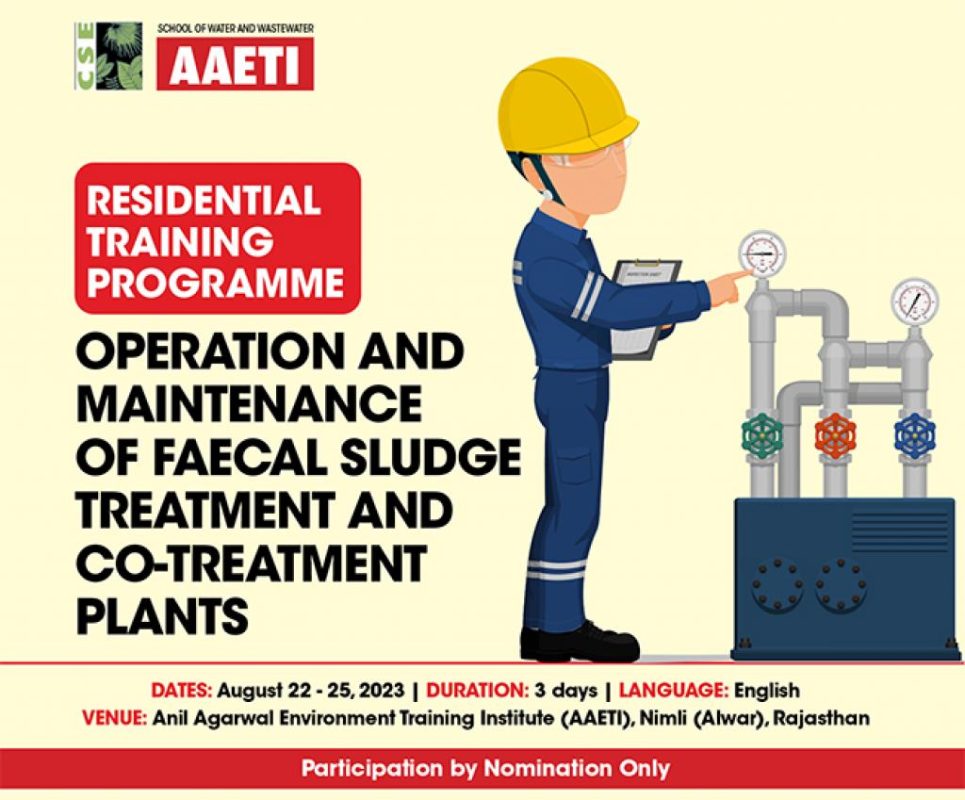Residential Training Programme Operation and Maintenance of Faecal Sludge Treatment and Co-Treatment Plants : CSE

![]()
Date: Aug 22-25, 2024 / Duration: 3 days / Language: English / Venue: Rajasthan
The Centre for Science and Environment (CSE) is a public interest research and advocacy organisation based in New Delhi. CSE researches into, lobbies for and communicates the urgency of development that is both sustainable and equitable. The scenario today demands using knowledge to bring about change. In other words, working India’s democracy. This is what we aim to do.The challenge, we see, is two-pronged. On the one hand, millions live within a biomass based subsistence economy, at the margins of survival. The environment is their only natural asset. But a degraded environment means stress on land, water and forest resources for survival. It means increasing destitution and poverty. Here, opportunity to bring about change is enormous.But it will need a commitment to reform – structural reform- in the way we do business with local communities. On the other hand, rapid industrialization is throwing up new problems: growing toxification and a costly disease burden. The answers will be in reinventing the growth model of the Western world for ourselves, so that we can leapfrog technology choices and find new ways of building wealth that will not cost us the earth. Our aim is to raise these concerns, participate in seeking answers and in pushing for answers, transforming these into policy and so practice. We do this through our research and by communicating our understanding through our publications. We call this knowledge-based activism. We hope we will make a difference.
FSSM (faecal sludge and septage management) is a widely accepted and practiced mode today of managing this stream of waste. Many Indian states have setup and operationalised faecal sludge treatment plants (FSTPs),and many more are in the implementation stage. The challenge that confronts them now is seamless operation and maintenance of these facilities.
Centre for Science and Environment (CSE) has been at the forefront of initiatives to build capacity and offer technical support for creating sustainable FSM infrastructures. For instance, CSE has been working in Uttar Pradesh since 2015 with the Department of Urban Development to put in place effective septagemanagement systems and practices in the state, and building capacity of the state officials and stakeholders has been high on the agenda.
Building on this state-level experience, CSE is now offering a three-day residential training programmeon operations and maintenance of FSM plants.
Course Fees
There is no training fees. CSE will provide travel support from Delhi to the training centre and back; it will also offer boarding-lodging support for the duration of the training programme.
All other travel and related expenses will have to be borne by the nominating agency/organisation.
Aim of the training programme
To build capacity of state/municipal functionaries involved in implementation, operation and maintenance of faecal sludge and co-treatment plants across India.
Who will this programme benefit?
- Engineers (civil/mechanical/environmental) working with Urban Local Bodies under national/state FSSM initiatives
- Representatives of implementing/executing agencies involved in O&M of FSTPs and co-treatment plants
- Other technical officials dealing with FSSM under AMRUT and Swachh Bharat Mission (U).
Training methodology
The training methodology will follow a mixed approach involving lectures, group exercises, interactive discussions, video documentaries, exposure visits etc.
What does the programme offer
- Fundamentals of FSSM
- Overview of different FSSM technologies
- Operating guidelines and O&M of different de-sludging vehicles
- Strategies for effective O&M
- Health and safety in FSTP operations and maintenance
- O&M protocols of different FSSM technologies including best management practices
- Laboratory aspects of FSSM
Training Coordinator
Jyoti Parsad Dadhich
Deputy Programme Manager
WaterProgramme, CSE
Mobile: +91-8559838864
Email: jyoti.parsad@cseindia.org
Training Director
Depinder Singh Kapur
Director, Water Programme, CSE
Email: dkapur@cseindia.org

